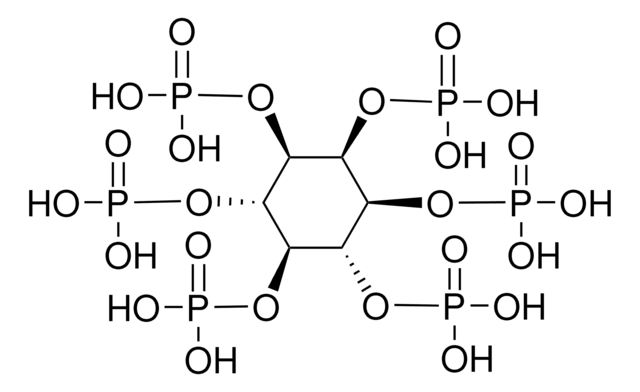Wszystkie zdjęcia(1)
Kluczowe dokumenty
03004
Abberior® STAR 512, maleimide
for STED application
Zaloguj sięWyświetlanie cen organizacyjnych i kontraktowych
About This Item
Kod UNSPSC:
12352111
NACRES:
NA.32
Polecane produkty
Poziom jakości
masa cząsteczkowa
Mw 861.7 g/mol
stężenie
≥50% (degree of coupling)
rozpuszczalność
DMF: 0.25 mg/mL, clear
fluorescencja
λex 512 nm; λem 530 nm±5 nm in PBS, pH 7.4
temp. przechowywania
−20°C
Opis ogólny
Absorption Maximum, λmax: 517 nm (MeOH),
511 nm (PBS, pH 7.4)
Extinction Coefficient, ε(λmax): 85,000 M-1cm-1 (PBS, pH 7.4)
Correction Factor, CF260 = ε260/εmax: 0.24 (PBS, pH 7.4)
Correction Factor, CF280 = ε280/εmax: 0.07 (PBS, pH 7.4)
Fluorescence Maximum, λfl: 533 nm (MeOH),
530 nm (PBS, pH 7.4)
Recommended STED Wavelength, λSTED: 590 −620 nm
Fluorescence Quantum Yield, η: 0.82 (PBS, pH 7.4)
Fluorescence Lifetime, τ: 4.1 ns (PBS, pH 7.4)
511 nm (PBS, pH 7.4)
Extinction Coefficient, ε(λmax): 85,000 M-1cm-1 (PBS, pH 7.4)
Correction Factor, CF260 = ε260/εmax: 0.24 (PBS, pH 7.4)
Correction Factor, CF280 = ε280/εmax: 0.07 (PBS, pH 7.4)
Fluorescence Maximum, λfl: 533 nm (MeOH),
530 nm (PBS, pH 7.4)
Recommended STED Wavelength, λSTED: 590 −620 nm
Fluorescence Quantum Yield, η: 0.82 (PBS, pH 7.4)
Fluorescence Lifetime, τ: 4.1 ns (PBS, pH 7.4)
Zastosowanie
Abberior® Star 512 labelled phosphoethanolamine lipid analogues were used for gated STED-FCS (stimulated emission depletion - fluorescence correlation spectroscopy) study.
Przydatność
Designed and tested for fluorescent super-resolution microscopy
Inne uwagi
Informacje prawne
abberior is a registered trademark of Abberior GmbH
Ta strona może zawierać tekst przetłumaczony maszynowo.
produkt powiązany
Numer produktu
Opis
Cennik
Kod klasy składowania
11 - Combustible Solids
Klasa zagrożenia wodnego (WGK)
WGK 3
Temperatura zapłonu (°F)
Not applicable
Temperatura zapłonu (°C)
Not applicable
Wybierz jedną z najnowszych wersji:
Certyfikaty analizy (CoA)
Lot/Batch Number
Nie widzisz odpowiedniej wersji?
Jeśli potrzebujesz konkretnej wersji, możesz wyszukać konkretny certyfikat według numeru partii lub serii.
Masz już ten produkt?
Dokumenty związane z niedawno zakupionymi produktami zostały zamieszczone w Bibliotece dokumentów.
Mathias P Clausen et al.
Methods (San Diego, Calif.), 88, 67-75 (2015-07-01)
Recent years have seen the development of multiple technologies to investigate, with great spatial and temporal resolution, the dynamics of lipids in cellular and model membranes. One of these approaches is the combination of far-field super-resolution stimulated-emission-depletion (STED) microscopy with
S W Hell et al.
Optics letters, 19(11), 780-782 (1994-06-01)
We propose a new type of scanning fluorescence microscope capable of resolving 35 nm in the far field. We overcome the diffraction resolution limit by employing stimulated emission to inhibit the fluorescence process in the outer regions of the excitation
Marcus Dyba et al.
Nature biotechnology, 21(11), 1303-1304 (2003-10-21)
We report immunofluorescence imaging with a spatial resolution well beyond the diffraction limit. An axial resolution of approximately 50 nm, corresponding to 1/16 of the irradiation wavelength of 793 nm, is achieved by stimulated emission depletion through opposing lenses. We
Tim Grotjohann et al.
Nature, 478(7368), 204-208 (2011-09-13)
Lens-based optical microscopy failed to discern fluorescent features closer than 200 nm for decades, but the recent breaking of the diffraction resolution barrier by sequentially switching the fluorescence capability of adjacent features on and off is making nanoscale imaging routine. Reported
Stefan W Hell
Nature biotechnology, 21(11), 1347-1355 (2003-11-05)
For more than a century, the resolution of focusing light microscopy has been limited by diffraction to 180 nm in the focal plane and to 500 nm along the optic axis. Recently, microscopes have been reported that provide three- to
Nasz zespół naukowców ma doświadczenie we wszystkich obszarach badań, w tym w naukach przyrodniczych, materiałoznawstwie, syntezie chemicznej, chromatografii, analityce i wielu innych dziedzinach.
Skontaktuj się z zespołem ds. pomocy technicznej




